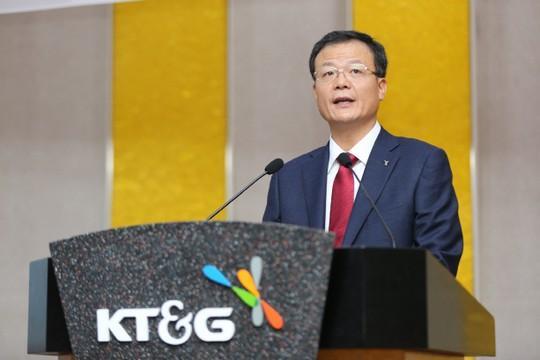IBK takes issue with KT&G CEO appointment
Industry watchers question reasons behind state-run bank intervening in business management
By Kim Da-solPublished : Feb. 21, 2018 - 15:58
What had seemingly been a smooth process at South Korea’s leading cigarette maker KT&G to reinstate its chief has been met with unusual interference from the state-run Industrial Bank of Korea, which is making increasing moves to get involved in the firm’s management.
The bank holds 6.9 percent stake in KT&G and receives estimated dividends of 35 billion won ($32.5 million) annually.
The bank holds 6.9 percent stake in KT&G and receives estimated dividends of 35 billion won ($32.5 million) annually.

Citing its voting right as a stockholder, IBK said it would simply be exercising its vote to approve or not approve of the consecutive appointment of the tobacco maker’s current chief Baek Bok-in. But industry insiders view there could be an ulterior motive behind the state-run bank publicly announcing its engagement in a certain company’s business management.
Currently, foreign investors make up more than 53 percent of KT&G stakeholders. Most of them, however, are silent partners whose main focus is profitability, rather than actively getting involved in business management.
The biggest single shareholders of KT&G are: the state-run National Pension Service (9.09 percent); IBK; US-based First Eagle Investment (5.04 percent); and New York-based Black Rock Fund (5.03 percent).
Generally, foreign stakeholders do not actively engage in business management. In other words, this gives more room for IBK to step in to intervene in KT&G’s future business management, only if they decide to do so.
Earlier this month, IBK said through a regulatory filing that its purpose of holding KT&G stocks has changed from “investment” to “management involvement,” according to the Financial Supervisory Service. The purpose can be changed unilaterally by the investor if the shares exceed 5 percent.
According to IBK, it feels a need to become involved due to risks posed by the CEO and to acquire higher business transparency.
The bank cites a case in 2011, when KT&G was alleged to be using double bookkeeping after acquiring a 60 percent stake in Indonesia’s sixth-largest tobacco manufacturer Trisakti Purwosari Makmur to become the major shareholder. The bank said while it would not be against the law for Baek to resume the post, it would raise risks. The case is currently under investigation.
IBK is also taking issue with how the nomination process for the new CEO took just two days. Firms here usually receive applications for chief executive posts for five days on average.
IBK has since said it would be opposing the reelection of Baek and that it would recommend two outside directors.
In its argument, IBK touts the stewardship code -- regulations concerning principles that institutional investors are expected to follow once it steps in to engage in management.
But industry insiders point to how IBK’s sudden shift coincides with policy directions of the current administration.
In September last year, IBK scrapped a plan set in 2015 to sell its stake in KT&G, saying the decision was made as the bank believes it would be more beneficial to hold its shares of KT&G rather than selling them for a one-time profit, as the business environment has changed.
“While the bank said it was voluntarily decided to participate in business management, market watchers can make an educated guess that the government and other state-run banks have pressured IBK to make such decision,” said a market watcher at Mirae Asset Global Investments.
Korea’s Ministry of Strategy and Finance holds a 51.8 percent stake in IBK and the rest is owned by two state-run banks -- the Korea Development Bank and Export-Import Bank of Korea.
Some have viewed that the government may be tempted to exercise its power via IBK in its endeavors to control sensitive issues such as tax on cigarettes and tobacco-related government policies.
“Although the KT&G has been changed to private management in 2002, it is true that the tobacco industry has always been within the government’s sight and interest, which means that the government will continue to try not to lose an opportunity of exerting power on their businesses,” said an industry watcher.
By Kim Da-sol (ddd@heraldcorp.com)


![[Exclusive] Korean military set to ban iPhones over 'security' concerns](http://res.heraldm.com/phpwas/restmb_idxmake.php?idx=644&simg=/content/image/2024/04/23/20240423050599_0.jpg&u=20240423183955)




![[Pressure points] Leggings in public: Fashion statement or social faux pas?](http://res.heraldm.com/phpwas/restmb_idxmake.php?idx=644&simg=/content/image/2024/04/23/20240423050669_0.jpg&u=)











